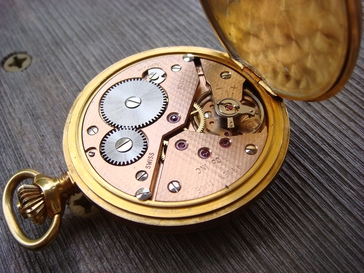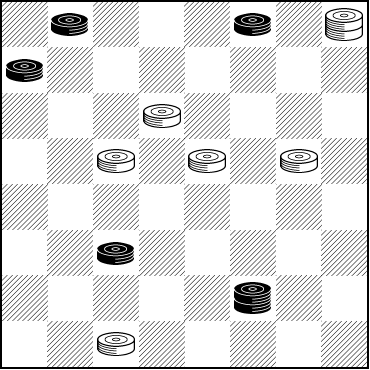The Checker Maven
Jump to navigationPrecision

There's the classic precision of a Swiss watch. There's the precision of a talented musician playing a difficult solo piece or the precision flying of Air Force pilots. The list goes on, and in our game of checkers, there is precision, too. Some lines of play leading to a win or saving the draw require extreme precision wherein one false move leads to either failure to bring home the win or an ignominious defeat.
The following position is from a recent game played between regular Toronto based contributors Lloyd and "Gosh Josh" Gordon. While after the first few moves many variations are possible, precision play is required by White to obtain a draw--- and careful play is required by Black to avoid a possible loss if a wrong move is made.

WHITE
White to Play and Draw
W:WK4,10,14,15,16,30:B1,3,5,22,K27
How precise is your play? See if you can draw this one, and then click your mouse precisely on Read More to see one version of the solution.![]()
Solution
Here's one way for White to draw. You can use your computer to explore this very rich position further.
| 1. | ... | 14-9 |
| 2. | 5x14 | 15-11 |
| 3. | 22-26 | 30x23 |
| 4. | 27x18 | 11-7 |
| 5. | 18-22 | 7-2 |
| 6. | 22-17 | 2-6 |
| 7. | 17-13 | 16-11 |
| 8. | 13-17 | 11-7 |
| 9. | 17-13 | 7-2 |
| 10. | 14-18 | 2-7 |
| 11. | 18-23 | 7-2 |
| 12. | 23-26 | 2-7 |
| 13. | 26-30 | 7-2 |
| 14. | 30-25 | 2-7 |
| 15. | 25-22 | 7-11 |
| 16. | 22-17 | 11-16 |
No progress can be made on either side. For instance suppose Black tries something different.
| 17. | 3-7 | 10x3 |
| 18. | 1x10 | ... |
It's to no avail. The game is drawn.
This study is more in the category of a useful practical study than that of an elegant composition. The Checker Maven aims to provide material of all types and varieties.
You can email the Webmaster with comments on this article.
